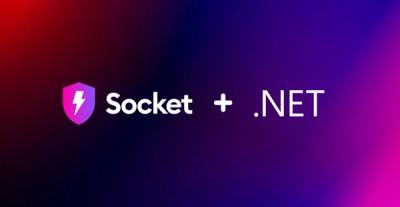
Product
Introducing .NET Support in Socket
Socket now supports .NET, bringing supply chain security and SBOM accuracy to NuGet and MSBuild-powered C# projects.
A python library for authenticating requests for various google services including ``gmail``, ``youtube``, ``drive`` and ``calendar``.
A python library for authenticating requests for various google services including gmail, youtube, drive and calendar.
To get started with this library, you need a google account in order to obtain access credentials. First, pick a service that you want to use, which could be:
- gmail
- youtube
- drive
- calendar
The next step is to instal the library from pypi:
pip install gverify
In this case we will use youtube as the service. We will authorize a request to search youtube for python programming videos:
from gverify import GoogleOAuth, YouTubeScopes
client_secret_file: str = 'client_secret.json'
api_service_name: str = 'youtube'
api_version: str = 'v3'
credentials_dir: str = '.youtube'
scopes: list[str] = [YouTubeScopes.youtube.value]
oauth: GoogleOAuth = GoogleOAuth(
secrets_file=secret_file,
scopes=scopes,
api_service_name=api_service_name,
api_version=api_version,
credentials_dir=credentials_dir
)
youtube_client = oauth.authenticate_google_server()
youtube_find_request = youtube_client.search().list(q='python programming videos', part='id, snippet')
print(youtube_find_request.execute())
Currently, this library does not intergrate with web frameworks like Flask and fastAPI. To use flask, we use the underlying library:
from flask import Flask, url_for, redirect, request, session
from google_auth_oauthlib.flow import Flow
from google.oauth2.credentials import Credentials
import os
CLIENT_SECRETS_FILE = "client_secret.json"
SCOPES = [
'https://www.googleapis.com/auth/youtube.force-ssl',
'https://www.googleapis.com/auth/youtube'
]
API_SERVICE_NAME = 'youtube'
API_VERSION = 'v3'
app: Flask = Flask(__name__)
app.secret_key = 'secret-key'
@app.route('/')
def home():
if not session['credentials']:
redirect(url_for('authorize'))
return 'Home'
@app.route('/authorize')
def authorize():
flow = Flow.from_client_secrets_file(
CLIENT_SECRETS_FILE,
scopes=SCOPES
)
flow.redirect_uri = url_for('oauth2callback', _external=True)
authorization_url, state = flow.authorization_url(
access_type='offline',
include_granted_scopes='true'
)
session['state'] = state
return redirect(authorization_url)
def credentials_to_dict(credentials: Credentials) -> dict:
return {
'token': credentials.token,
'refresh_token': credentials.refresh_token,
'token_uri': credentials.token_uri,
'client_id': credentials.client_id,
'client_secret': credentials.client_secret,
'scopes': credentials.scopes
}
@app.route('/oauth2callback')
def oauth2callback():
state = session['state']
flow = Flow.from_client_secrets_file(
CLIENT_SECRETS_FILE,
scopes=SCOPES,
state=state
)
flow.redirect_uri = url_for('oauth2callback', _external=True)
authorization_response = request.url
flow.fetch_token(authorization_response=authorization_response)
credentials: Credentials = flow.credentials
session['credentials'] = credentials_to_dict(credentials)
return redirect('/')
if __name__ == '__main__':
os.environ['OAUTHLIB_INSECURE_TRANSPORT'] = '1'
app.run('localhost', 5000, debug=True)
To contribute, chack out the contribution guideline.
The API uses an MIT License
Lyle Okoth – @lyleokoth on twitter
lyle okoth on medium
My email is lyceokoth@gmail.com
Here is my GitHub Profile
You can also find me on Linkedin
FAQs
A python library for authenticating requests for various google services including ``gmail``, ``youtube``, ``drive`` and ``calendar``.
We found that gverify demonstrated a healthy version release cadence and project activity because the last version was released less than a year ago. It has 1 open source maintainer collaborating on the project.
Did you know?

Socket for GitHub automatically highlights issues in each pull request and monitors the health of all your open source dependencies. Discover the contents of your packages and block harmful activity before you install or update your dependencies.

Product
Socket now supports .NET, bringing supply chain security and SBOM accuracy to NuGet and MSBuild-powered C# projects.

Research
Malicious npm packages posing as Telegram bot libraries install SSH backdoors and exfiltrate data from Linux developer machines.

Security News
pip, PDM, pip-audit, and the packaging library are already adding support for Python’s new lock file format.